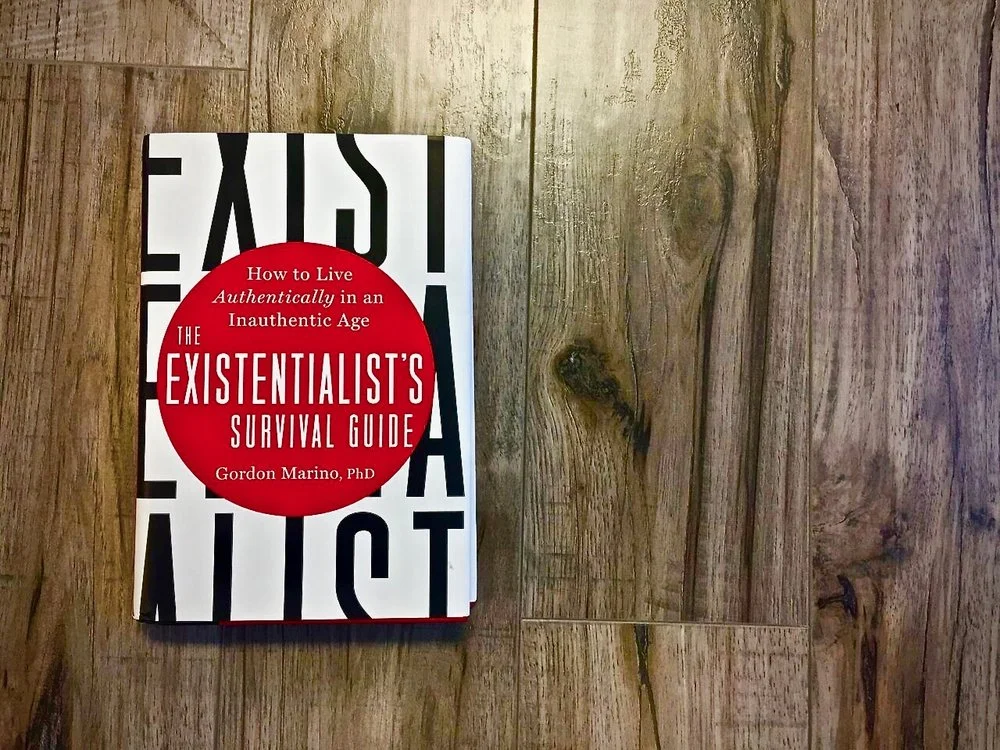The Existentialist’s Survival Guide: How to Live Authentically in an Inauthentic Age- Gordon Marino
Anyone who is a fan of NBC’s The Good Place, whether we know it or not, are probably at least vaguely aware of many principles of existentialism. At the very least, we’ve been introduced to the name Kierkegaard, as Season 2, Episode 7 is thematically centered around his most famous (and as Chidi points out, oft-mistranslated) phrase: “leap of faith.” Existentialism finds its beginnings in the 19th century within the works of Kierkegaard and Nietzsche, but was further developed in the early 20th century by thinkers such as Jean-Paul Sartre, Simone de Beauvoir, and Albert Camus. As opposed to a cold, distant, analytical philosophy that contented itself to hypotheticals and non-affective intellectual quandaries, existentialism arose from a place of deep angst regarding subjectivity and everyday, lived experience. Essentially, existentialism asks, “What does it mean to be human? What drives us? How do we search for meaning? How do we wrestle with dread and despair in the face of an absurd existence? And what does it mean to live authentically?”
It’s been argued that existentialism has its roots in the “disenchantment of the West” via Weber, as religion began to occupy a less prominent place in public discourse in the face of various emerging sciences. Existentialism also received another boost in the early 20th century, especially after the First World War, in which many writers attempted to grapple with the failures of modernism and postulated how to live in an absurd world in the face of an overwhelming exposure to meaningless death and violence (which kickstarted postmodernism after the travesties of the Holocaust). Existentialism seemed to resonate within the cultural ethos of post-war Europe (and to a lesser degree, America as well). The ennui of modernity was a ripe field for the seed of existentialism to flourish and grow, especially in societies typified by monotony, facelessness, and the ever-elusive grappling for meaning. These themes, however, were eventually overshadowed by a wave of public anger in the 60’s following the Vietnam War, the Civil Rights Movement, Nixon’s relentless administration, and California campus protests. Postmodernism, deconstruction, and political, social-justice oriented activism (including liberation theology) became the predominant fixtures of Western academic/theological discourse, leaving existentialism (with all of its focus on angst, meaning, and faith) for the concerns of bourgeois, privileged academics.
Through his work, The Existentialist’s Survival Guide: How to Live Authentically in an Inauthentic Age, Dr. Gordon Marino provides a renewed rendition of the merits of existentialism for the 21st century. The book primarily serves as a cursory survey of these central themes that existentialism, as a philosophical system, sets out to address, namely: anxiety, depression/despair, death, authenticity, faith, morality, and love. All of these issues, far from merely being the concerns of the elite, are rather intimately pressing in today’s cultural climate. It is glaringly apparent that Marino has a strong grasp on the source material that he uses to support his argument. Marino intricately wreaves the works of Kierkegaard, Dostoyevsky, Trotsky, Nietzsche and Sartre with his own reflections and recollections of the various ways in which existentialism has had profound impacts on his personal life. By incorporating the fragments of his own narrative, Marino often breathes fresh life into a subject that many might not otherwise care too much about. Also, as a self-confessed literature geek, I was also pleased to see Marino incorporate various examples of existential fiction (primarily from Russia), such as Dostoyevsky’s haunting Notes from Underground and Tolstoy’s The Death of Ivan Ilyich. Through these copious examples, Marino makes the case for how to live authentic, faith- (or, trust-) filled lives in our endeavour to combat, and yet live, with the trappings of despair and grief.
My primary criticism, however, is Marino’s nearly central focus on the writings of Kierkegaard. This is in no way a denigration of Kierkegaard’s works; in fact, he is one of my favorite writers within the existential tradition. Yet, Marino’s overwhelming focus on Kierkegaard often comes at the cost of other, potentially dissenting modes of existential thought, such as de Beauvoir, Marcel, Tillich, and Merleau-Ponty. By centering Kierkegaard and his emphasis on faith and religiosity as the main subject of the book, Marino quite purposefully makes existentialism out to be an incredibly Christian-centric enterprise, which is a bit misleading and one-dimensional. He makes vague attempts to anticipate criticism and thus secularizes Kierkegaard’s deeply religious concepts, yet it always rings a tad bit hollow and empty. Furthermore, the narrative of the book tends to follow a particular pattern that is far too common in philosophical memoirs: the author finds himself on the brink of despair until he/she comes across the work of [insert X philosopher here]. While the chapters on anxiety, despair, and faith particular shine through with the help of a Kierkegaardian analysis (along with his a Nietzschean take on morality), his concessions for the “spiritually squeamish” tend to simply be secularized religious concepts, many of which would not necessarily appeal to those averse to spirituality. Rather than looking to other atheistic authors in the tradition for voices of dissent, the work is rendered weaker by refusing to dig deeper into the perils and complexities of existentialist thought.
Overall, this book is a great introduction for those who may be unfamiliar with existential thought. It gives a quick and dirty survey of the general themes of existentialism, and by interweaving his own personal narrative, he takes complex theories and issues and makes them concrete. It’s essentially a philosophically-driven self-help book for those who are typically predisposed to loathe the genre. While some of his existential advice can come off as overly sentimental, it’s difficult not to believe in his sincerity and earnestness. Marino doesn’t offer clean-cut answers to life’s deepest questions, nor does he hold back in describing some of the less-than-savory parts of his own personal life. This humility and transparency is evident as he describes his continued wrestling with these existential questions, and is a welcome reprieve from what can often be distant, cold subject matter.
For those who are completely unfamiliar with existentialism, this book serves as a fine jumping point, as it is an often relatable and relatively quick read. If the existential tradition is a five-course meal, then this book is a light appetizer: enough to satiate a vaguely curious appetite, but not nearly enough of a “survival guide” to satisfy the starving. Accordingly, for those who are intimately familiar with existentialism, this book offers little that is truly novel. For those who find themselves in need of a good pep talk with an existential flair, however, this book might just do the trick.

